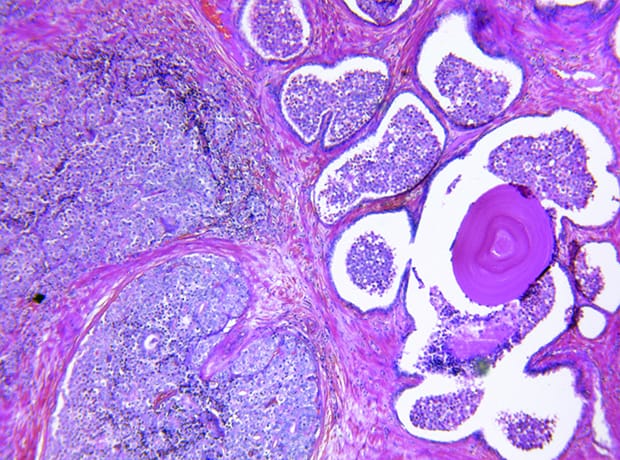How were you diagnosed with prostate cancer?
It started with the symptoms of enlarged prostate, and also a higher frequency of going to the loo. I also had difficulty with stopping, if you see what I mean.
What other symptoms were you experiencing?
I don’t think there was anything – that’s why I went to the urologist. I saw the urologist for a while and they took PSA readings, so it was them that diagnosed it officially. I saw a really unhelpful urologist initially who just laid out what the options were – he didn’t look up from the notes, didn’t make any eye contact and just said: “You must choose whether you want a biopsy, active surveillance or whatever”, so I asked to see somebody else, and for a second opinion. The second urologist was much more sympathetic; when there was something that came up that he said we had to look further into, I asked him what he would do in my position, and he told me! So, I said okay – that’s what I will do.
What was your experience with low dose-rate (LDR) brachytherapy like?
I think before discussing that it’s best to mention that first there was an attempt to remove the prostate. There were difficulties initially, because I had already had some external beam radiotherapy in 1976 for testicular cancer. The urology and cancer teams said there were reasons why surgery might be difficult, but also reasons against having external beam radiotherapy again. When they opened me up they found that there were just too many adhesions. When I was coming round the surgeon said: “We haven’t managed it, what we would recommend is brachytherapy and a lot of people choose that as their first option – so don’t think about it as second best.” So, that’s what I did.
With regard to the brachytherapy, the actual procedure itself was not too difficult, really. In the aftermath I was left quite fatigued and with an irritated bladder, which meant that I was going around five times a night. I suppose it was mainly the fatigue, but in terms of comparing it to the surgery in 1976 – when I had a testicle removed, that was very painful for several days, I mean, almost unbearable – this was a walk in the park really!
How else would you compare your prostate cancer treatment to the treatment you received for testicular cancer in 1976?
It seemed much less invasive. It was definitely gentler, I didn’t feel as – I’m not sure if this is the right word, but – assaulted as I did in 1976, I really felt quite assaulted by that, whereas this time I was just slowed down for a bit. So, off badminton and not going for the walks that I used to have, but over time that was okay. I could see each month that I was gathering more stamina and strength.
Do you know specifically how your treatment in 1976 affected the way they treated you more recently?
It was to do with the after-effects of the external beam radiotherapy. It meant that it wasn’t possible to remove the prostate and therefore brachytherapy was the clear option of choice.
What were you told about your prognosis at the time?
Well, I suppose it’s a cliché that they tell to everyone but I was told that a lot of men die with prostate cancer, but not from it. You can have it, and it gets treated and not that many people die directly from it – so there’s not much reason to worry because we’re very optimistic that you’ll be okay and so should you be.
Are you satisfied with the NHS care you’ve received?
Yes, I was. Particularly with the specialist nurse that we were encouraged to ring if we any anxieties of uncertainties and I found her particularly helpful. Especially at the time of being given the diagnosis, so she took myself and my wife into a room and gave us as much time as we needed, and I was able to phone her at any time. Obviously, sometimes you wake in the night when something’s bothering you and you can’t get resolution, and she was incredibly and very responsive in those kinds of situations. If she couldn’t answer the question there and then, she would say “I’ll deal with a consultant and then get back to you”.






